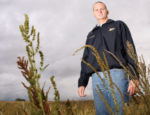Advertise Follow Us
Articles Tagged with ''waterhemp''
Taming Variable Soils To Hit Record-Breaking No-Till Yields
No-till, fungicide, in-furrow insecticide and precision technology helped Bob Little reach nearly 300-bushel corn on his northwest Indiana farm’s variable soils.
Read More
No-Till, Covers Make CRP Acres Protected And Productive Again
Missouri farmer Jerry Morris says no-till and cover-crop mixes helped him put CRP acres back into crop production and keep his sloping fields from suffering erosion.
Read More
Recent Rainfall, Early Harvest May Bring Flush Of Fall Weeds
Properly applied fall burndown herbicides can control quick-hitting winter annuals and provide some residual protection, making for cleaner no-till fields ahead of planting next spring.
Read More










